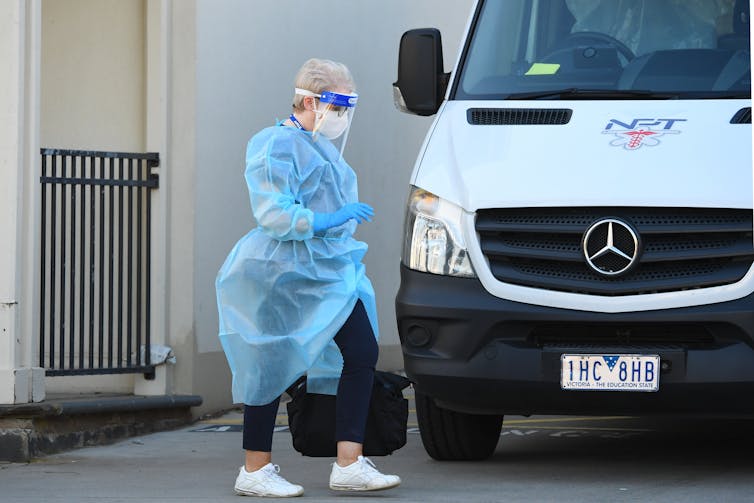Taking proper sick leave has never been more crucial. So why are people still 'soldiering on' at work?
- Written by Esme Franken, Lecturer in Management, Edith Cowan University
New South Wales premier Gladys Berejiklian, who last week carried on working for up to two hours while awaiting the results of a rapid COVID test, wasn’t the first Australian to “soldier on” in the face of health concerns and a big day at work.
And she almost certainly won’t be the last, despite the COVID pandemic making it clearer than ever before it’s important to take time off if you’re sick or self-isolating.
Soldiering on — also known as “sickness presenteeism” — is alive and well even in 2020. Many people, from state premiers to minimum-wage workers, feel they have no choice but to show up and carry on. Those with precarious employment may feel as if their entire job hinges on it.
If a pandemic won’t get workers to call in sick, then what will? What we need is for managers and leaders (state premiers included) to model responsible behaviour, and foster a healthy workplace culture in which soldiering on isn’t celebrated as heroic.
A 2016 report by Pathology Awareness Australia estimated the economic costs of workers turning up sick or putting in unnecessary extra hours at more than A$34 billion a year, due to productivity loss and the spread of infection to coworkers.
Since the advent of COVID, it has become a significant public health issue too. Cases have been traced to workers spreading the virus at work, including abattoirs and health-care facilities.
Presenteeism is found throughout the employment spectrum, but is more prevalent among “essential” workers, such as those in health care, who typically report feeling “socially obligated” to attend work.
Read more: Presenteeism: A new word for working when sick
A 2019 survey of 6,387 women in the public sector found 90% had gone to work while sick in the preceding 12 months. The main reasons included workload pressures (52%), and the perception they weren’t sick enough to stay home (54%).
But why is sickness presenteeism still a thing in 2020? The sad fact is that even amid a pandemic, workers in essential services such as aged care and teaching report feeling pressured by their managers to turn up to work.
Another reason is the broader socioeconomic issue of job insecurity. Workers on temporary or casual contracts may not have sick pay entitlements at all, or feel their job is at risk if they are absent. Coupled with the workload pressures typical of precarious work, these people face an almost impossible dilemma when sick or self-isolating.
 Many essential workers, like aged care staff and teachers, feel pressured to present to work even when feeling sick.
James Ross/AAP
Many essential workers, like aged care staff and teachers, feel pressured to present to work even when feeling sick.
James Ross/AAP
The onus is on businesses and organisations to ensure a safe working environment. This means establishing clear expectations and protocols regarding staying home when unwell, and should also include the opportunity for remote working when workers feel well enough to work but may still be infectious. Workplaces should also provide appropriate personal protective equipment, hand hygiene, and social distancing measures.
Organisations should offer medical and well-being support and care to employees at risk of suffering most under sickness presenteeism, such as essential workers and those in precarious employment.
More broadly, managers and organisations should understand that tacitly encouraging people to come to work while unwell impairs organisational performance. Leaders should not preside over a culture in which overwork and “always being on duty” are lionised. Instead, they should communicate that it’s OK not to come to work if you’re not well, and that it’s important to take a sick day if you’re sick.
A crucial element of this is to prepare contingency plans for absences, so employees know that work can still be done without them and their absence won’t be disastrous.
Read more: 'Far too many' Victorians are going to work while sick. Far too many have no choice
It should go without saying that you shouldn’t have to go to work when you’re sick (or self-isolating, which is the 2020 twist on a sick day). Many of us — especially those on the COVID frontline — may identify very strongly with our job, and view going to work as crucially important. But amid a pandemic, following health guidelines is paramount.
Unfortunately, the pressure to turn up to work regardless of illness comes from a range of sources: unsympathetic bosses, unfair employment conditions, or a personal reluctance to change your schedule. But as the backlash against Gladys Berejiklian proved, it’s rarely a wise move to soldier on.
Authors: Esme Franken, Lecturer in Management, Edith Cowan University





